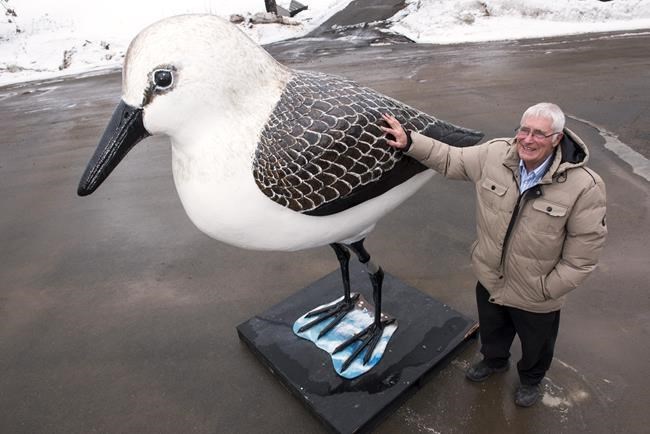FREDERICTON — A new sculpture has been commissioned and a platform has been built — but a New Brunswick village's oversized avian avatar has still not returned to its roost.
Standing 2.4 metres high and weighing 135 kilograms, the statue of a semipalmated sandpiper was once the pride of Dorchester.
Since 2001, Shep — named after nearby Shepody Bay — had pointed thousands of tourists and townsfolk to the mudflats of the Bay of Fundy, where the pint-sized shorebirds gather in late July in a pit stop on their flight from the Arctic to South America.
After the original wooden statue started to rot and had to be removed three years ago, local officials commissioned a $10,000 reincarnation made of steel, epoxy and fibreglass. The result is now sitting in the workshop of artist Robin Hanson in French Lake, N.B., as municipal officials try to untangle what one former official said is "red tape" grounding the bird.
A recent municipal amalgamation has stalled payment for the sculpture. "They invested in the platform, the steps and there's no bird," Kara Becker, the former deputy mayor of Dorchester, said with a laugh. "It actually looks terrible because, as you know, Dorchester has the prison there and it had a jail and it kind of looks like hanging gallows to me." She said people in Dorchester are willing to raise funds for the statue.
The Dorchester village council commissioned Hanson to craft a replacement Shep, but on Jan. 1, the village was merged with Sackville and Pointe de Bute to form Tantramar. That meant Shep took a back seat.
Debbie Wiggins-Colwell, who was mayor of Dorchester and is now a councillor for Tantramar, said she is "working diligently" and is hopeful Shep will be on its perch before the community's annual sandpiper festival in July. Tantramar Mayor Andrew Black did not return a request for comment.
The semipalmated sandpiper looks similar to a sparrow, weighing about 20 grams — less than a handful of coins — with a 30-centimetre wingspan to power its long trek. Starting in early July and peaking by mid-August, millions of these birds stop on the Fundy beaches to feed and double their weight before making the 2,500-kilometre journey to South America, said Nick Lund, a network manager for Maine Audubon.
Hanson said he is confident the problem will get resolved and Shep will take its rightful place. No stranger to oversized sculptures, he said that when making a statue that's many times the size of the real bird, he has to be careful, because every mistake is magnified.
"Look, that's why you measure not once, not twice, but probably about 10 times for everything you do," he said.
Once Shep is on display, it will join a host of other larger-than-life roadside monuments in the province, including Blowhard the Bony Horse in Cardwell, Lady Potato in Grand Falls, a giant axe in Nackawic, a lobster in Shediac, and Buttercup the Cow and Daisy the Calf in Sussex.
Keith Dewar, a tourism and hospitality professor from the University of New Brunswick, said New Brunswick is sometimes called a "pass through province" leading to more popular East Coast destinations, such as the urban centre of Halifax, Anne of Green Gables' house in Prince Edward Island or Peggy's Cove in Nova Scotia.
Novelty attractions are one way that smaller communities can convince travellers to pull over, Dewar said. "If you have a big sandpiper, big lobster or something else — people might stop and buy a coffee."
Wiggins-Colwell said the area's economy relies heavily on the tourism brought in by the sandpipers, both tiny and enormous.
After COVID-19 shut down tourism for two years, it's all the more vital to have Shep on a platform showing tourists the way to the semipalmated sandpipers.
"We have to celebrate that," she said. "(The statue) is a very good way of doing it. It's kind of an icon."
This report by The Canadian Press was first published March 26, 2023.
The Canadian Press




